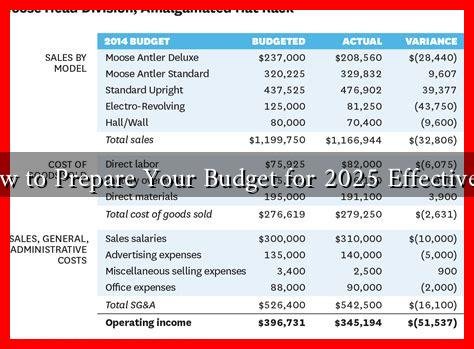-
Table of Contents
How to Prepare Your Budget for 2025 Effectively
As we approach the end of 2023, it’s crucial to start thinking about your financial future and how to prepare your budget for 2025. A well-structured budget not only helps you manage your finances but also sets the stage for achieving your financial goals. In this article, we will explore effective strategies for budgeting, including understanding your income and expenses, setting financial goals, and utilizing budgeting tools.
Understanding Your Financial Landscape
The first step in preparing your budget for 2025 is to gain a clear understanding of your current financial situation. This involves analyzing your income, expenses, and savings. Here are some key components to consider:
- Income Sources: Identify all sources of income, including salaries, bonuses, freelance work, and passive income streams.
- Fixed Expenses: List your fixed monthly expenses such as rent or mortgage, utilities, insurance, and loan payments.
- Variable Expenses: Track your variable expenses, which can fluctuate monthly, such as groceries, entertainment, and dining out.
- Savings and Investments: Review your current savings and investment accounts to understand your financial health.
According to a survey by the National Endowment for Financial Education, only 30% of Americans maintain a budget. Understanding your financial landscape is the first step toward joining this group and taking control of your finances.
Setting Financial Goals for 2025
Once you have a clear picture of your financial situation, the next step is to set specific financial goals for 2025. Goals can be short-term, medium-term, or long-term. Here are some examples:
- Short-term Goals: Pay off credit card debt, save for a vacation, or build an emergency fund.
- Medium-term Goals: Save for a down payment on a house or fund a child’s education.
- Long-term Goals: Plan for retirement or invest in a business.
Setting SMART (Specific, Measurable, Achievable, Relevant, Time-bound) goals can help you stay focused and motivated. For instance, instead of saying, “I want to save money,” specify, “I want to save $5,000 for a vacation by December 2025.”
Creating Your Budget Plan
With your financial landscape and goals in mind, it’s time to create your budget plan. Here are some effective budgeting methods to consider:
- The 50/30/20 Rule: Allocate 50% of your income to needs, 30% to wants, and 20% to savings and debt repayment.
- Zero-Based Budgeting: Assign every dollar a specific purpose, ensuring that your income minus expenses equals zero.
- Envelope System: Use cash for variable expenses by placing money in envelopes designated for specific categories.
Choose a method that resonates with you and fits your lifestyle. For example, if you prefer a hands-on approach, the envelope system might work best. Alternatively, if you enjoy technology, consider using budgeting apps like Mint or YNAB (You Need A Budget) to track your expenses digitally.
Monitoring and Adjusting Your Budget
Creating a budget is just the beginning; monitoring and adjusting it regularly is essential for success. Here are some tips for effective monitoring:
- Review Monthly: Set aside time each month to review your budget and track your spending.
- Adjust as Needed: Life changes, and so should your budget. Be flexible and adjust your budget to reflect changes in income or expenses.
- Celebrate Milestones: Acknowledge when you reach financial goals, no matter how small, to stay motivated.
According to a study by the American Psychological Association, individuals who regularly monitor their finances are more likely to achieve their financial goals.
Conclusion
Preparing your budget for 2025 effectively requires a clear understanding of your financial landscape, setting achievable goals, creating a structured budget plan, and regularly monitoring your progress. By following these steps, you can take control of your finances and work towards a secure financial future. Remember, budgeting is not just about restricting spending; it’s about making informed decisions that align with your financial aspirations. Start today, and you’ll be well on your way to achieving your financial goals by 2025.
For more resources on budgeting and financial planning, consider visiting NFCC (National Foundation for Credit Counseling) for expert advice and tools.

